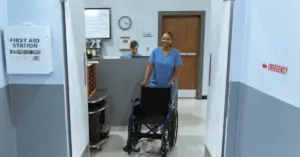As a travel nurse, short-term leases become essential for housing between assignments in different cities.
While new in the short-term rental world, you can master temporary leases with proper diligence and preparation.
Follow the tips below to ensure smooth contracting and smart housing decisions as you embark on exciting cross-country travel nursing ventures.
Embracing Short-Term Leases for Maximum Flexibility
Opting for leases under 6 months or a year provides the flexibility and mobility your dynamic career demands. You avoid being locked into a long-term rental when your assignment concludes.
Short-term leases allow you to adapt your housing as contracts change.
If you only need a rental for 8-12 weeks, don’t hesitate to seek month-to-month options. Just ensure the landlord and property meet your standards for temporary stays. The flexibility short-term housing provides makes it a prime choice for travel nurses.
Understanding Short-Term Lease Pricing
Landlords often charge higher monthly rents for short-term leases compared to annual contracts. This premium results from the churn of signing new leases more frequently.
Landlords may also furnish units and incorporate utilities to attract short-term tenants.
While the higher monthly rate might seem frustrating, remember you save substantially by avoiding lease-break fees and related costs with long-term contracts not suited for travel nurses.
Weigh costs like furniture purchases and moving expenses too. Sometimes short-term leases become the more affordable overall choice in the long run.
Scrutinizing the Fine Print Thoroughly
Just like annual leases, short-term contracts contain legal clauses you must understand. Pay particular attention to:
- Renewal terms – Is extending your lease possible if your assignment gets prolonged? What’s the process?
- Early termination – Are there penalties for breaking the lease early? How much notice is required?
- Maintenance responsibility – Who handles repairs or addresses maintenance issues in the unit?
Never assume policies will automatically favor you. Read every paragraph closely to make informed decisions protecting yourself.
Negotiating Favorable Short-Term Lease Terms
Given your unique situation, politely negotiate aspects of a short-term lease before signing.
Many landlords appreciate the temporary but steady income travel nurses provide between long-term tenants. You can potentially negotiate:
- Reduced rental rate – Especially if committing to multiple months, a lower price may be possible.
- Included amenities – See if utilities, internet, cable, parking, etc. can be bundled into the rent.
- Flexible lease dates – Ask for wiggle room on start and end dates in case assignments shift.
- Lower deposit – Providing positive references may lower the required security deposit amount.
Remember – a cordial request is more effective than a demand. Explain how both parties can benefit through reasonable negotiations.
Protecting Your Security Deposit
Security deposits for short-term leases work the same as annual ones. Expect paying a deposit equal to about one month’s rent. Follow these tips to ensure the full return of your deposit:
- Photograph/video the entire unit upon move-in to document pre-existing conditions.
- Maintain open communication with the landlord and address any maintenance issues immediately.
- Keep the unit neat and avoid damage beyond normal wear and tear.
- Thoroughly clean the rental upon moving out.
Following lease guidelines for maintenance and move-out gives you the best shot at recovering your full security deposit.
Preparing for Lease Extensions or Renewals
Ideally confirm upfront if extending your short-term lease is an option should your assignment get prolonged.
Reach out to your landlord several weeks in advance of your lease expiration if you think an extension may be needed. Renewal terms may vary from the original lease.
Having the ability to renew avoids moving twice or losing time seeking new housing last minute. Discuss extensions as early as possible.
Handling Early Lease Termination
Short-term leases still require proper notice if you must terminate before the expiration date – often 30 days. Understand any early termination penalties you’ll incur if exiting early.
When possible, alert your landlord of an early departure immediately once known.
Honest communication and following proper procedures will minimize negative consequences if an early exit becomes necessary.
Cultivating Positive Landlord Relationships
Like any relationship, clearly conveying needs and wanting to reach mutual solutions lays the groundwork for a positive experience.
Simple actions like paying rent on time, keeping the unit well-maintained, and giving proper notice show you’re a responsible tenant.
In return, a good landlord will hopefully address concerns promptly and work collaboratively.
Take time to get to know landlords as individuals too – not just profit-driven. Personal rapport can prove invaluable if lease questions or issues ever arise.
Key Takeaways
Short-term leases provide the flexibility imperative for travel nurses. While temporary, approach short-term rentals professionally.
Scrutinize terms, budget accurately, follow procedures, and communicate openly to ensure a positive housing experience.
Handled right, short-term leases become an adventure-enabler, giving you the freedom to embark confidently on your next nursing chapter.





